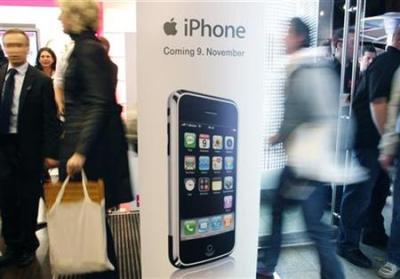Will Apple Respond to Protests Calling for Better Labor Policies?

Apple stores were hit with protests this week with consumers calling for the technology giant to ensure that the company's coveted products are manufactured ethically. Although Apple has yet to respond, experts believe that the protests are likely to drive a positive change in labor standards utilized along the company's supply chain.
Protesters gathered outside several Apple stores across the U.S. on Thursday to hand the tech leader, known for developing groundbreaking products, a petition signed by over 250,000 people calling for the company to guarantee that fair labor standards are practiced among outsourced employees – a majority of which work in China.
Stores around the world, including shops located in London, San Francisco, and Bangalore were also handed the petition, which additionally called for the company to produce an "ethical iPhone."
The call for Apple to ensure its products are manufactured under conditions compliant with fair labor standards comes weeks after The New York Times published a two-part report on working conditions of laborers in Chinese factories. The push also follows a broadcast on the weekly public radio show, "This American Life," in which Mike Daisey recounts his chilling encounter with a Foxconn manufacturing plant that builds, engineers, and assembles Apple merchandise in China.
Foxconn is a Taiwanese manufacturing company that is responsible for developing and assembling products for some of the world's top electronic companies, including Apple, Dell, and Hewlett-Packard.
In his, "This American Life," broadcast, Daisey – an author, actor, and fervent Apple fan – highlighted the plight of Chinese workers at a Foxconn plant in the southeastern Chinese province of Shenzhen, where the company employs and houses around 430,000 workers.
In the broadcast, the eccentric actor shared in detail how the Foxconn factory he visited violated labor laws by allegedly employing minors as young as 12-years-old, working them for excessive hours on end – sometimes to death, and housing them in cramped and unsafe conditions.
"This is like nothing we've seen in a century," Daisey said as he questioned how a detail obsessed company like Apple could dismiss the shocking realities behind the construction of its own top of the line products.
After listening to Daisey's shocking encounter, Mark Shields of Washington, D.C., began questioning the ethics behind his own favorite tech gadgets and became inspired to start a petition at Change.org to call for Apple to prevent the egregious labor violations within its supply chain.
The petition has already received over 200,000 signatures and was instrumental in springing forth Thursday's protest and petition calling for ethical Apple products.
"Here's the thing: you're Apple. You're supposed to think different. I want to continue to use and love the products you make, because they're changing the world, and have already changed my life. But I also want to know that when I buy products from you, it's not at the cost of horrible human suffering," Shields wrote in the petition.
The self-described "accidental advocate" additionally outlined a number of changes he hoped that Apple would implement, including urging the company to develop a worker protection strategy for new merchandise releases, and asking that it make the audit results of its factories accessible to the public.
"Please make these changes immediately, so that each of us can once again hold our heads up high and say, 'I'm a Mac person,'" Shields pleads.
Apple has yet to respond to the petition, however, CEO Tim Cook emailed Apple employees following the January New York Times story outlining conditions at Foxconn factories, arguing that the story was "offensive."
"What we will not do – and never have done – is stand still or turn a blind eye to problems in our supply chain," Cook wrote in the email, according to Reuters.
Despite the fact that Apple has not released an official public statement regarding the petition and protests, experts believe the company that prides itself on reputation will respond to consumer demands.
"Whenever something like this happens to a corporation like that, which is rich enough to do something about it, (they) will try and do something about it," Andrew Mack, Director of the Human Security Report and professor at Simon Fraser University's School for International Studies, told The Christian Post.
Apple has already made steps to improve its accountability by becoming the first technology company admitted into the Fair Labor Association, a move that the brand argues will set "a new standard for transparency and oversight."
Now with Thursday's protest behind it, Apple is likely to further implement even more changes to ensure that better practices are utilized within its global supply chain, and to safeguard itself from similar scrutiny in the future, observers suggest.
Although Apple can, and most likely will, begin to set the wheels in motion to become an industry leader repected not only for its high quality products, but for its repect for the human rights of every employee that comes into contact with its product, deplorable conditions for most factory employees across the developing world will likely persist.
Despite public outcry and response from one of the biggest companies in the world, businesses not concerned with the reputational cost of exploiting labor are likely to continue not caring "one iota" about the inhumane working conditions of people assembling their products around the globe, according to Mack.
Thus, even if Apple's standards – which are argued to be better than most –improve, there is no indication that the company's response to public condemnation would spur a global movement to ensure workers in the developing world are treated with respect and dignity.
So long as poverty exists, companies are likely to exploit people for their own finanical benefit, but Thursday's protest indicates that there exists a substainal pool of consumers who are willing to put pressure on companies to guarntee that their favorite products are engineered, assembled, and built by employees who are treated with dignity.


























